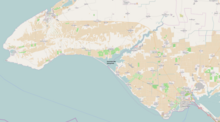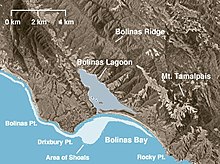A peresyp (пересыпь) or a bay-mouth bar[1] is a narrow sandbar that rises above the water level (like a spit) and separates a liman or a lagoon from the sea. Unlike tombolo bars, a peresyp seldom forms a contiguous strip and usually has one or several channels (caled girlo (гирло) in Russian) that connect the liman and the sea. [2][3] The noun пересыпь is derived from the verb пересыпать, "sprinkle over".



Similarly to spits, peresyps are formed by actions of surf zone currents from sand, gravel/pebbles, and crushed shells as a result of longitudinal (longshore drift) or transverse transport of sediment.[3] Sometimes a peresyp may be formed when two spits on the two sides of a liman grow and eventually meet.[4]
Both limans and peresyps can be maritime (the peresyp bar is created by the currents of a sea) or fluvial (the peresyp bar is created by the slowed or turned flow of a sediment-saturated river).[5] Sometimes the sediments close the channels in a peresyp and sometimes the water washes them through again. Even when there are no channels, the water can still seep through or spill over the peresyp. The sea water evaporates within the closed liman, thus increasing its salinity. In this way, converting from limans, a number of salt lakes in Crimea were formed.[2]
A number of geographical locations are called "peresyp", most notable being the Peresyp district of Odesa built on the wide peresyp that bars the Khadzhibey and Kuialnyk limans from the Black Sea. Other locations include the Anapa Peresyp spit, Tylihul Peresyp by Tylihul Estuary, Ukraine
Peresyps have poor but peculiar flora and fauna.[6]
See also edit
References edit
- ^ "Sandbar (geology)". Encyclopedia Britannica. Retrieved 29 August 2018.
- ^ a b Федченко Г.П, 'О самосадочной соли и соляных озерах Каспийского и Азовского бассейнов 1870, p. 54
- ^ a b ПЕРЕСЫПЬ, Great Soviet Encyclopedia
- ^ Aleksandr Inostrantsev, Геологія.Общій курсъ, 1914. p.91
- ^ (in Romanian) Mihai Ielenicz (ed., 1999): Dicționar de geografie fizică, Corint publ., Bucharest, 1999 ; Grigore Antipa (1941) : Marea Neagră, Romanian academy press, Bucharest, 1941, pp. 55-64, and Petre Gâștescu, Vasile Sencu (1968) : Împărăția limanelor, Meridiane publ., Bucharest.
- ^ ИЗУЧЕНИЕ БИОРАЗНООБРАЗИЯ ПОДТВЕРЖДАЕТ ВЫСОКУЮ ПРИРОДООХРАННУЮ ЦЕННОСТЬ УРОЧИЩА ВИТЯЗЕВСКАЯ ПЕРЕСЫПЬ В ГРАНИЦАХ ПРИРОДНОГО ПАРКА «АНАПСКАЯ ПЕРЕСЫПЬ»